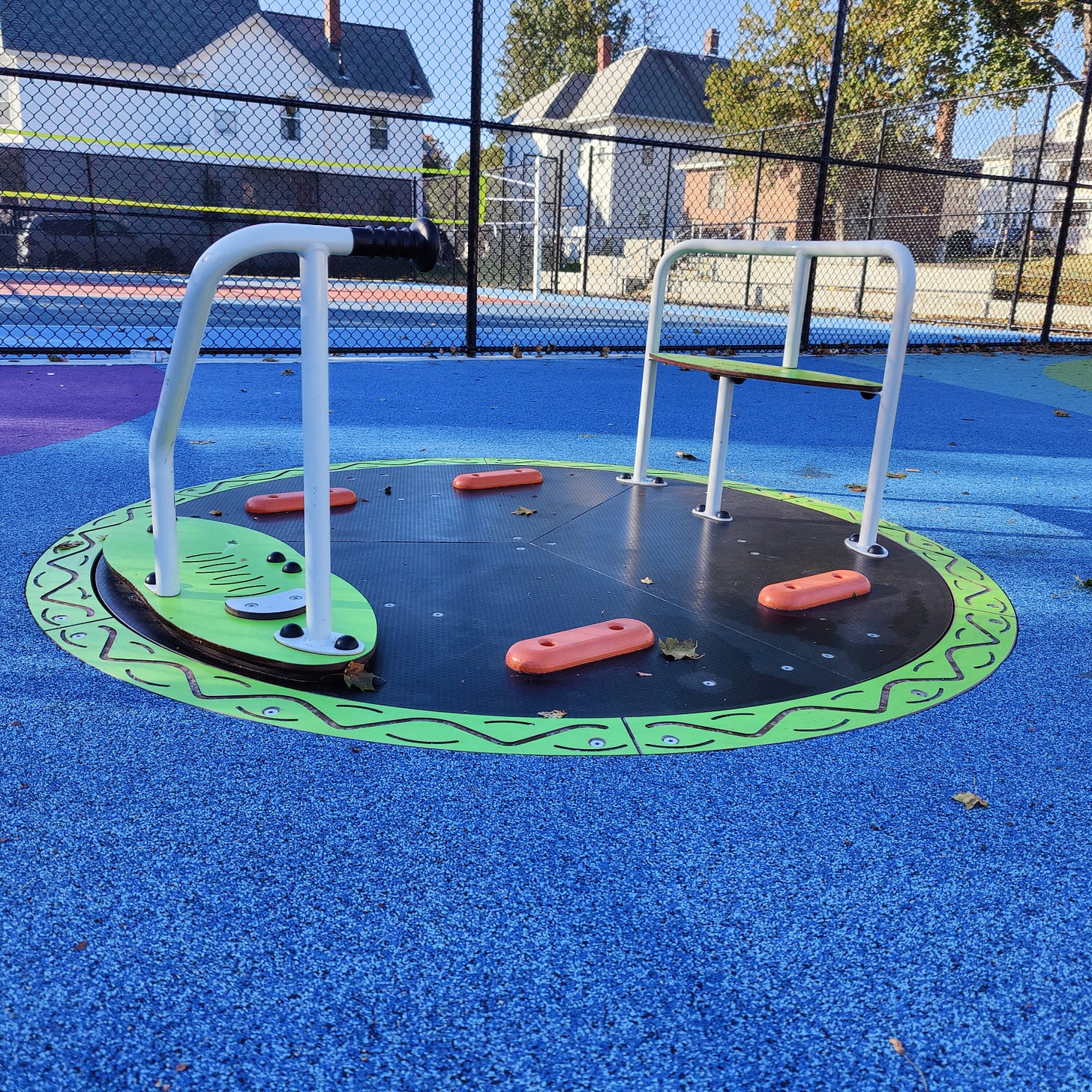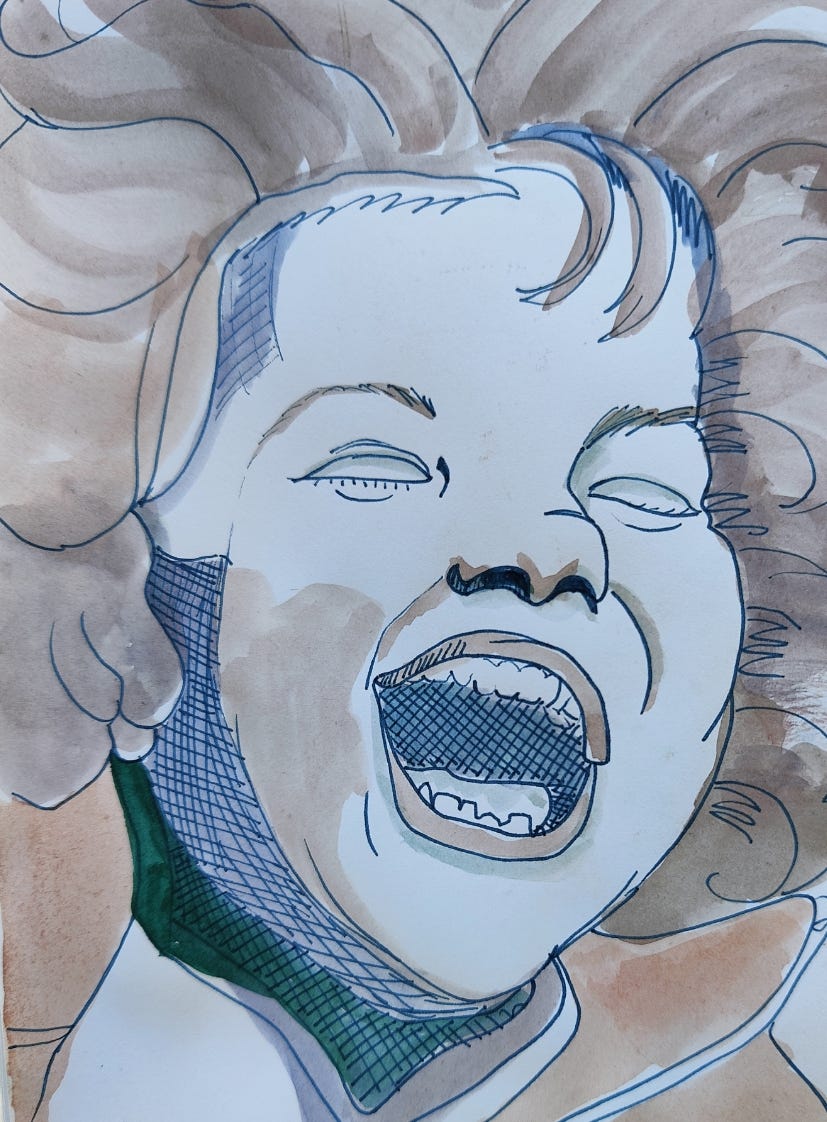The Roundabout
A story of childhood hope and resiliency
It was that magic hour: an early October sunset had cast a deep periwinkle glow on the cloudless sky that twirled overhead. Below, Julio's little body revolved, both calmed and enlivened by the dizzying spin of the playground roundabout. He was nestled safely between his mothers's legs which kept him from sliding off the spinning disk. His aunt spun them round faster. There, the two of them together lay in the still middle gazing upwards. Julio contently sucking on his pacifier while his mother giggled in his ear. Time slowed to a near stop.
That first turn on the roundabout was followed by many more. As a toddler, he graduated to sitting up on his own in the middle while his mother pushed him. Every time it slowed, he would make the sign for more with his hands and the ride would start again. Later, as a preschooler, the job of pushing was left to other playground children. Invariably, the child pushing the roundabout would lose interest, run off to chase a friend, or be called home by a parent.
One day, as he sat in the middle of the roundabout with no one to give him a push, he tightly shut his eyes and wished hard, imagining the roundabout spinning under that original magical twighlight sky. Just then, a child showed up with an inviting sing-song call, "Want a push?"
As is the way with so many childhood superstitions that tie unrelated causes to outcomes, he believed fully that the new-found ritual of shutting his eyes and wishing hard gave him a superhuman power to exert control over his world. He was so often in the habit of exercising it - in the store, at school, in front of the TV, and Christmas morning - that his mother thought he had developed a tic. She admonished him with the oft-stated precept, "If you keep shutting your eyes like that, they'll get stuck that way."
By the time Julio was a teenager, the groove he had dug was so deep and so well-worn that mind over matter for Julio was a reality. Until it wasn't.
One afternoon, after school, he found his mother in the kitchen with a letter in her hand, a foreclosure notice from the bank. "Son, it's about our home," she said, "Well, the house." They wouldn't be able to live there anymore, she explained with tearful eyes. The only option was moving out. They would have to find a new place to live. He would be living with his father temporarily.
It couldn't be. It made no sense. His mother and her family had raised him, not his father. He didn't even know his father; couldn't even recall his face. Only one dim memory from long ago remained. His father had returned briefly hoping to make things right with his mother. They had taken Julio to the playground believing that if they pretended they were a family, they might actually become one. Any plan for reconciliation must have soured because within a matter of minutes, Julio who had just started spinning on the roundabout heard his mother's voice. "Time to go!" She was scowling. She turned away and began to walk briskly toward the house. His father's darkened shape meandered off down the hill heading in a different direction. Julio, afraid he was being left by not just one but both parents, whipped himself off the spinning roundabout onto the bouncy playground surface. He shut his eyes, wishing his mother to stop and wait. He stood up, opened them, and shouted, "Wait! I'm coming!" She had waited. And, her face had softened just as he had wished.
Now, ten years later, his mother sat at the table her face lined with hard work and worry, telling him it was no use fighting the bank, there was no way out of it, and he'd be living with his father. What Julio didn't know was that since her parents had died and her siblings had moved out, she hadn't been able to afford the mortgage for months and was behind. She had reached out to Julio's father and requested his help; he responded enthusiastically, jumping at the chance to finally make up for his absence.
Julio stood, bookbag in hand, listening to the impossible and then listing every reason he could dream up as to why the bank couldn't take their home. And then, after watching his mother shake her head too many times to stomach, he summoned his magic power. He closed his eyes tight and wished hard, as hard as the baby who wanted the roundabout to keep spinning and as sincere as the little boy who was afraid of being left alone at the playground so long ago. He opened his eyes, hopeful, but this time his mother's face hadn't softened.
There was nothing left to do but run out the door, across the street to the playground, to the roundabout. He sat on one of its three little benches, now too small to support his adolescent frame. The roundabout hadn't moved in years; it had rusted stuck.
Just then, a little boy of four rushed up, tapped him on the shoulder, peered into Julio's eyes and said, "Want a push?" For a moment, Julio felt a familiar sensation, deep inside his body. The twighlight sky began to spin and he felt the calm of the centripetal center that came with the predictable motion of the roundabout.
A light chill ran down his spine. He stood up, pointed to the rust on the roundabout, and said to the child, "It doesn't spin anymore."
The child, with a look of momentary disappointment, considered the fate of the roundabout and tested it by pushing with an audible grunt. When it wouldn't give way, the child shrugged his shoulders and then, smiling as if his disappointment had been picked up and carried effortlessly away by the fall breeze, galloped away.
Thank you for reading! I wrote this as a < 1,000 short story with the encouragement of Jami Attenberg and her “1,000 Words of Summer” challenge. Also, thanks to Tim Lott and his Boot Camp participants for their feedback. The story was inspired by a visit I made with my son to a local playground where I saw a very happy infant take a spin on the roundabout. Watercolor of child by me.




Such lovely symmetry in this story, Emily. And a beautiful watercolour. I love the pen work!
The sadness of this, of Julio. And the ‘okay, whatever,’ pluck of the little four year-old at the end 🥹